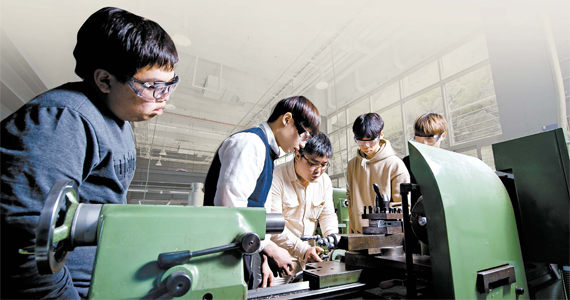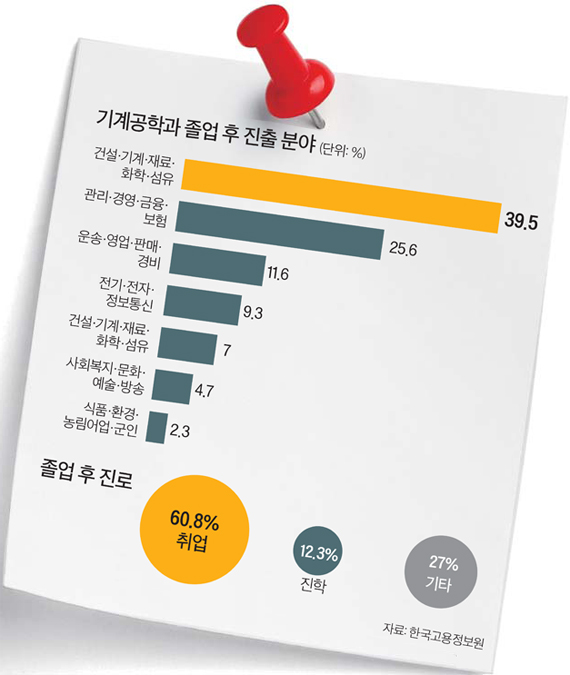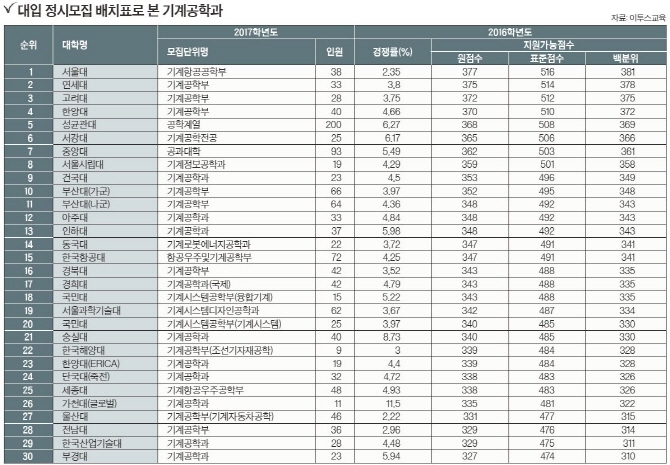Department News
[JoongAng Ilbo] Mechanical Engineering, the basics of all engineering. Applicable in Areas Ranging from Automobiles, Aerospace,
[Faculty Navigation] Mechanical Engineering, the basics of all engineering. Applicable in Areas Ranging from Automobiles, Aerospace, Robot and Even Bio.
<?xml:namespace prefix = "o" ns = "urn:schemas-microsoft-com:office:office" />
From the heavy industries that develop and design cheaper and more effective machines to medicine, mechanical engineering is more of a “Multi play” Engineering. Dennis Hong, Chan Jin Lee, So Yeon Lee, etc all active in many different areas
Mathematics and Physics is considered of the most fundamental, curriculum includes the 4 major mechanics and even design and prototyping. “ Exciting due to its many applications in life”. Requires teamwork, patience and communication due to the large number of team works.
Dennis Hong, robot engineer, Chan Jin Lee, creator of “Hangul and Computers”, and astronaut So Yeon Lee. What do they all have in common? These people, while all specializing in their different fields, all majored in mechanical engineering. Mechanical engineering is the foundation all engineering, with its applications on industries such as cars, airplanes, ships, architecture, civil engineering, aerospace, etc. Many students dream of becoming a scientist or astronaut and hope to major in mechanical engineering. However, there are not many places where one can find more information of the major other than the college’s homepages. Hence, we looked into what careers mechanical engineering can offer, and what students study in this major.
Mechanical Engineering now influencing Energy and even Medicine
“During fabrication, what is more important than anything else is good measurements. You cannot use the material anymore if you measured it wrong.” Said Kyung Hwan Park, the in charge for hands-on sessions while explaining the usage of the lathe, one of the crafting tools used to modify a material.
“Creak” Last 31st, an annoying sound could be heard when we entered “Idea Factory”, located in the 2nd story basement of SNU’s building 39. 6 students, divided into groups, of the mechanical engineering faculty were processing a cylindrical metallic material on the lathe. They were reducing its length and cutting notches in the material. When a metal was placed in the machine, the plate holding the metal would rotate at high speeds allowing the exterior of the material to be cut off. “It is important to be knowledgeable in the material you’re working with to be good in design, one of the key aspects of mechanical engineering” said Kyung Hwan Park, the in charge of the hands-on sessions of the mechanical engineering faculty. “Through these practice sessions, students will not only learn how to use these machines but will also learn more about the specific properties of the materials they will be working with such as metals, plastics and rubbers.” He added.
The core principle being taught in mechanical engineering is good design of equipment required in daily life. Machines use movement energy to do work, or in simple words, it is a faculty where people research on how to make things such as cars, washing machines, and refrigerators cheaper, stronger and more efficient. Sung Ho Hwang, the dean of mechanical engineering in Sung Kyun Kwan University mentioned that “ It is much easier to understand using a washing machine as an example. Researching whether a strong pressure of water or a hard impact removes stains better or finding a more comfortable method to open and close washing machine doors are all part of mechanical engineering”.
Because the field is so applicable, many career paths are open as well. Mechanical engineering has a direct relation to future cars, high speed trains, satellites, energy, and others that make life more comfortable. SNUMAE Dean Su Gap Lee (Aerospace) said that “ Recently, the range of fields than mechanical engineering applies to have been widening due to combinations and complexities in the academics. Aside from car industries, heavy industries and aerospace industries, mechanical engineering has been reaching out to even electrical, energy, medicine and biology related fields, such as creating hard disks the size of fingernails and curing diseases.”
Theory and practice taught in a ratio of 3 to 2
The curriculum can be generally divided into fundamentals and majors. In the first year, students begin learning physics and mathematics, whereas in the 2nd year students begin to dive into the mechanics subjects such as solid mechanics, thermodynamics, fluid mechanics and dynamics.
Mechanics refer to academics researching on the movement of materials. For example, if thermodynamics is used in understanding how air conditioning keeps an interior cold, Solid mechanics is used in understanding how a house or bridge can support a substantial amount of weight. Fluid mechanics is used in the design of aerodynamics in cars and planes, whereas the concept of a plane flying and a car moving would be related to dynamics. Professor Seung Jin Park of the mechanical engineering faculty in POSTECH says “ Just learning the 4 major mechanics is not enough in building machines. One has to understand the mechanical properties of materials, and even know how to use computers to program and design blue prints.”
Typically, theory and practice lessons are taught in a ratio of 3 to 2. The theory lessons are basically extensions of physics lessons taught in high school but with applications in real life. 3rd year ME student Ye Jin Park (박예진) of POSTECH says that the solid mechanics class she listened to in her 2nd year was the most interesting. Beams of I cross sections are stronger than those of square cross sections, which is why I-sectioned beams are used to make buildings than can stand against strong winds. She also said “I thought it was a complex major but is was interesting how related mechanical engineering is to our daily lives. Finding out how much weight a chair can hold and finding a structure than can hold the most weight with the least amount of materials used are all part of mechanical engineering.”
Crafting and designing in teams just like corporates.
The best part of mechanical engineering is the crafting practice sessions. This is because, to make an actual moving object, students have to apply all the knowledge they have learnt in lectures. While it differs between colleges, in the first year, students take the creative engineering design course, the crafting practice sessions in their 3rd year and the graduation crafting in their 4th. Because student have to make machines that move with power, the process is extremely meticulous and complex. But there is also the feeling of achievement when an idea in their head comes to life.
These experiences not only improve understanding but also helps in building a student’s career path. Seon Hye Kim who currently works as a researcher in the Korea Institute of Nuclear Safety after her doctorate in mechanical engineering in Sung Kyun Kwan University originally entering into the engineering field to become a landscape architect. However, after building a toy tank that shoots projectiles in her first year, she decided to walk the path of a mechanical engineer. She said that the fact that a simple line of “ Create a machine that can shoot a projectile at a target “ can become something she can be a part of in making in real life appealed to her and brainstorming with her teammates to solve problems was very fitting to her personality.
This can be a sneak peek towards the corporate life as well. SNU has a Creative Design Engineering course in the first year and a “Design, Production practice” in the 3rd, which require students to form groups of 7 comprising of a team leader, a scribe, and 5 members, very similar to working a team project in a company.
Just like how Samsung hold a survey to review the public’s opinion before developing a new phones, Students create a list of “customer” requirements, a theoretical blueprint and a detailed blueprint before getting to work on a machine. Throughout the process, students also constantly review the design and get advice from professors through consultations to check for any problems. SNUMAE 4th year Aerospace major Ju Hyun Kim said that “If the design process is not meticulous enough, halfway through the building process prices can rise dramatically or crafting may not be possible at all due to wrong measurements. 5~6 hour long meetings to prevent these problems are a given, and the team leader, just like a real company, may even review the design throughout the night before a consultation with a professor.”
Entrance into other fields with relative ease
One of the best advantages of ME is the open career paths. SNUMAE 4th Year ME student Seung Hyun Han says “ I recommend applying for mechanical engineering if one does not have a clear path on what type to engineering to major in. Mechanical Engineering is the fundamental of all other types of engineering which makes entrance into other fields such as electrical engineering or computer science relatively easy”
What type of students enroll? Students who are better at physics and mathematics than at other subjects is a given. SNUMAE 3rd year ME student ji Young Baek said that “ if high school physics is additions then college contents are skin to calculus. Students aiming for mechanical engineering should be proficient in their Physics 2 syllabus”. In other words, students who have a difficulty finding interest in physics may not find Mechanical Engineering to be a good fit even if he/she manages to enroll.
But that does not mean that students need to learn college materials in advance either. SNUMAE ME professor Kyung-su Lee said that “Students in the gifted program who learn physics material taught in year 1 do not show better results in their second year as compared to other students, despite their better grades in their first year. Learning theory without its applications in real life scenarios do not help much at all.” 
Mechanical engineering also requires patience and tenacity. Creatively designing machines are important but to have good results, endless challenges and effort is required to solve problems faced while designing.
Communication and teamwork are just as important as well. This is because of the numerous team projects and assignments. Bad communications can lead to problems in design and development processes. Seon Hye Kim said that “ There are numerous instances where one’s own competency may not be enough to go thorough mechanical engineering. An attitude that is open to other people’s opinions is very important. The experience with many problems I brainstormed with my team mates during my college years helped a lot after employment in sharing opinions with others and resolving conflicts.”
Source : Korea Educational Development Institute (2014)

Career paths after graduation
The most employed sector is the automobile industry, with many students going to graduates school as well.
| Employment in Hyundai, Kia, GM, Hyundai Mobis etc
| Decreased employment in heavy industry and architecture sector due to bad economy
| Admission into graduates school leaves open countless opportunities
‘Employment Thug’, a common phrase used to describe faculties that have a high employment rate. Mostly refers to Mechanical Engineering. Because it is a fundamental to many other fields of engineering, it is that much easier to get into different industries after graduation. Work industries can include cars, heavy industries, power industries, home appliances, civil engineering, architecture, ship building, aerospace, electrical, materials, iron, semiconductors, etc
SNUMAE ME professor Kyung-su Lee said that “Chemical engineers and electrical engineers are the mains of electrical companies and semiconductor companies. However, building a strong cellphone and creating a semiconductor producing machine, that’s the job of mechanical engineers. As log as its not handmade art products, there is no industry where mechanical engineering is not used, which is why the career paths are very wide as well.”
Nicknamed ‘Employment Thug’, company – school cooperation is very active as well.
Of the career paths, the most commonly picked one is the car industry. From the research development to the production line, every process is related to mechanical engineering. From making a more powerful engine to developing faster and safer car parts, mechanical engineering is present in every step. SKKU ME Dean Sung Ho Hwang said “30~40% of graduates work in Hyundai, GM, Hyundai Mobis, Hyundai Power Tech, under design and production. It can simply be seen as making stronger and faster part production lines.”
However, recently, career paths into the architecture and heavy industries have been decreasing. Because of the decrease in orders from plants in oil producing countries due to decrease in oil prices, the ship building companies competitively ordered off shore plants which lead to a loss and a bad economy in this industry. Researcher Seung Jae Yeom who currently works in the Hyundai Hybrid ability development team after getting his masters in SKKU ME said “ because it is a major that has deep relations with the industries, it will definitely be affected by the economy. Up until 2013, there were quite a bit of students going into the heavy and construction industries but now rarely anyone looks for employment in this industry.”
In the school, various efforts are made to help the employment of the students. Of the efforts made, company excursions take the cake. Students who visit the automobile and heavy industry factories get to see the theories learnt in lectures put to use in real like scenarios and get information on the type of work and the company during these excursions.
There are schools that run company – school cooperation programs. SKKU works with LG Chemistry and Samsung SDI to aid the students’ employment. Students who apply to the company and get chosen receive a 4 year scholarship and internships during holidays, and are only required to work for 2 years after graduation. Dean Hwang said that “Less than 10, typically 4~5 students receive the benefits of these programs every year”
POSTECH offers start-up mentoring programs by linking students with the alumnis. It typically works in 3 stages where the 1st stage has students comfortably talking and getting to know their alumnis in the mentoring café, and the 2nd stage where students receive internships in start-up companies run by their alumni to gain some experience in the POVI(POSTECH Venture Innovators) and the 3rd stage where students get to put their start-up ideas to real life scenarios in the APGC(Association of POSTECH Grown Companies) –Lab. POSTECH ME Professor Sung Jin Park (박성진) said “ every year, 2~3 new venture companies are set up. Now korea represent the best in many different industries and hence there is a need to produce new start-up companies’
“Around half or SNU students enroll in the graduates school”
There are students who choose graduates school over employment. For SNU 45.7% (2013), for POSTECH 76%(2015), for SKKU 22.3% (2015) of the students enrolled in the graduates school. It is less of not being able to but more of not wanting to. This is mainly because of the countless opportunities for research in the faculty 4th Year SNUMAE Aerospace Student Ju Hyun Kim said that “I learn more of the general aerospace content in my undergrad years and want to research more deeply into rocket engine development in graduates school. About half of the students enroll in graduates school in SNU”.
The school also helps student participate in graduates school researches through research participation programs. Appointed researcher Kyeong Jae Cha who currently works in the Korea Institute of Industrial Technology after his doctorate in POSTECH said “ I took part in many different researches in my 2nd year including polymer molding and robot control. Through the experiments, I could see how theory was applied in these researches which appealed to me. This naturally led me to enroll in the graduates school”
The doorstep to research labs are getting lower and lower. Professor Park said” recently, each research lab has set aside a different topic in which undergrads can participate in. there are many students who participate in 2~3 researches before they graduate.” SNUMAE ME 4th year student Seung Hyun Han (한승현) said that “every year there is an “Open Lab” event where students have a chance to see what kind of research is being conducted in the research labs and a possibility to participate as an intern is present in the 2nd year”Article = Journalist Min Hee Jeon jeon.minhee@joongang.co.kr
Pictures = Journalist Kyeong Rok Kim kmikr8486@joongang.co.kr
Article Shortcut http://news.joins.com/article/19844450
